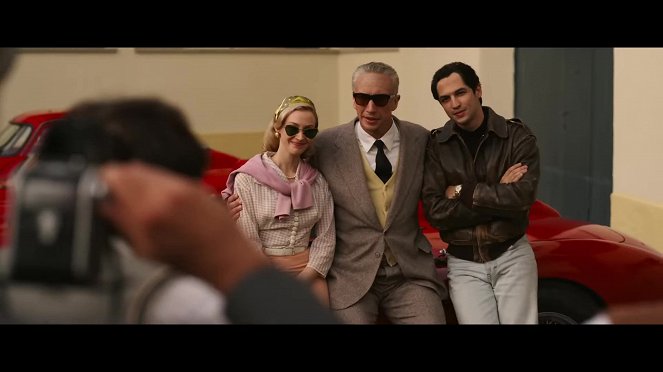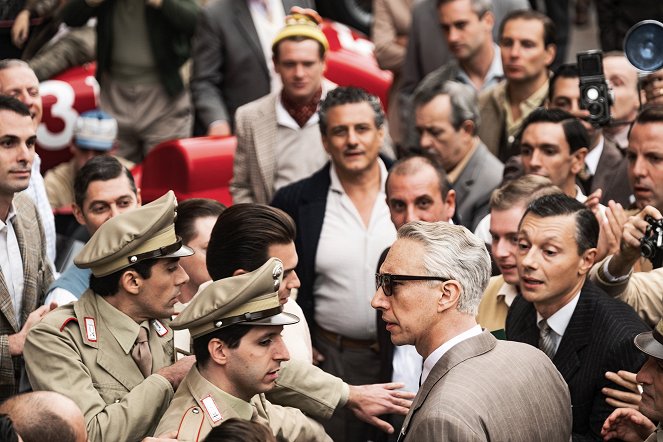Réalisation:
Michael MannScénario:
Troy Kennedy-MartinPhotographie:
Erik MesserschmidtMusique:
Daniel PembertonActeurs·trices:
Adam Driver, Penélope Cruz, Shailene Woodley, Gabriel Leone, Sarah Gadon, Alessandro Cremona, Jack O'Connell, Patrick Dempsey, Daniela Piperno (plus)Résumés(1)
À l’été 1957, alors que l’excitation et le danger des courses de Formule 1 grandissent, l’ancien pilote Enzo Ferrari est en crise. La faillite guette l'entreprise que lui et sa femme Laura ont bâtie dix ans plus tôt. Leur mariage tumultueux est mis à l’épreuve depuis le décès de leur fils, alors que Ferrari est réticent à reconnaître son autre fils avec Lina. La soif de gagner le poussera alors à tout parier sur une périlleuse course de 1000 miles à travers l'Italie, l'emblématique Mille Miglia. (Entract Films)
(plus)Vidéo (7)
Critiques (9)
Le premier quart d’heure introduit de façon magistrale les personnages centraux, leurs souffrances intérieures, leurs conflits et leurs motivations. Et en particulier le personnage d’Enzo Ferrari, industriel et ingénieur, homme de fer et de principes à la vie familiale brisée. Adam Driver était né pour jouer ce rôle, l’énergie et le ton du film reposent encore plus sur lui que sur les voitures. La musique sombre et en même temps énergique de Daniel Pemberton, parfois accompagnée de voix, donne une âme au film. Le style rétro des décors et des autres personnages est excellent, et chacun des acteurs secondaires a la personnalité nécessaire. Les dialogues pertinents mettent en lumière le danger mortel inhérent à la passion des coureurs, ainsi que la position délicate de Ferrari et de son entreprise dans l’industrie automobile – la responsabilité en matière de vies humaines dans le cadre de la course non seulement au prestige, mais aussi au maintien fondamental de l’activité de l’entreprise.
()
Michael Mann tells the story of one short period in the life of the owner of the famous car company. And unfortunately he tells a story that is not very attractive or engaging. In addition, Adam Driver plays a distant, cold professional who keeps his emotions in check, resulting in a rather dull film. This changes in the last part, when the racing starts and Mann shows that he's still good at directing action, even if he can come across as somewhat old-fashioned. Overall, though, Ferrari is a pretty uninteresting film about people struggling with a personal crisis and a once-in-a-lifetime loss, only that one of them happened to be a car designer.
()
The omission of Penélope Cruz in the Oscar nominations is completely incomprehensible to me. Adam Driver is fine here, he doesn't try to overact with "Italian-style" expressionism, even in tense scenes his acting is nicely decent, and I even believed that grey hairpiece on his head, but the main star for me is Penélope. Not the cars, about which I know nothing, not the races, but this woman, tormented by emotions and doubts, fights an internal battle throughout the film, only to capitulate at the end, because the family business is above all. And related to this is Michael Mann's intention, he doesn’t try to approach Enzo Ferrari's life with some boring biographical description and ticking off the years, but to bring the marital discord of a prominent family to life in a short period of time. And the races are just a nice addition, though the production is nicely polished and the cinematography nicely dramatic. I'd have perhaps only two criticisms, I don’t think it’s necessary in a non-English speaking setting to adapt the English of the actors into some sort of accented pidgin, as happens here, and I would have preferred not to see those CGI cars flying through the air in such a nicely old-fashioned film.
()
Enzo Ferrari teaches his son that when things work well, they are pleasing to the eye. Michael Mann follows the same maxim. Ferrari, another of his portraits of an obstinate professional in an existential crisis, is a joy to watch thanks to its narrative cohesiveness and the fact that it rhythmically fires on all cylinders. During practically every shot in the exposition, we learn some important information that will be put to good use later in the film. At the same time, the exposition introduces the governing stylistic technique consisting in the use of duality and contrasts (e.g. light scenes with Enzo’s mistress vs. dark scenes with his wife). Slower scenes regularly alternate with faster ones, movement alternates with motionlessness and the melodramatic (and utterly operatic in one scene) exaggeration of certain emotions, particularly sorrow, which both spouses deal with, each in their own way. Mann follows the example of classic Hollywood directors like Hawks and Sirk and lets the mise-en-scéne tell much more of the story than other contemporary directors would allow. At the same time, he defies the conventions of classic biographical dramas as he focuses only on a brief period of Ferrari’s life and, instead of creating artificial conflicts, he superbly dramatises everyday encounters and ordinary business operations (paying wages, signing documents, concluding agreements with investors). This feel for detail also contributes to the believability of the fictional world. Ferrari’s work always clashes – either constructively or destructively – with his personal life (Ferrari finds common ground with his son thanks to his work, but he also loses his wife because of it). The lion’s share of emotion and excitement is typically found in the cinematically brilliant scenes of races, which represent Ferrari’s greatest passion. Unlike other sports movies, however, such scenes do not bring catharsis, but rather recall the fragility of life (thanks in part to the excellent sound design, the race cars of the time really do not seem safe) and recognition of the fact that however hard you try to have everything under control, certain events cannot be foreseen and you ultimately have no choice but to accept them and somehow incorporate them into your life story. 90%
()
Michael Mann returns after a long time with the stiffing biopic Ferrari, and it's fine, although more was expected. It seems to me that all the big directors, except for Nolan, have disappointed and failed to fully realize their potential this year. Those who expect another Ford vs Ferrari, Rush, or Gran Turismo from Ferrari will be slightly disappointed because the you won't get to enjoy many races. Even the final race lacks drive, tension, and atmosphere. Mainly, I didn't understand the rules, so it doesn't give you proper satisfaction, and the fact that the racers themselves are uninteresting and the rivalry with Maserati could and should have been tangible and impactful is also to blame, but when I consider that Michael Mann mainly wanted to shoot a film about Enzo Ferrari and his personal life and problems, and the race itself is just there, so to speak, I'm fine with it. Because when it comes to acting, it's top-notch quality. Adam Driver is excellent, I liked the dialogues and his performance, he's just an interesting personality. Penelope Cruz also skillfully supports him, portraying a pissed-off woman perfectly. These interactions between them are nicely intense. The retro visuals and the atmosphere of post-war Italy are also well done. Surprisingly, Mann manages to keep the viewer's attention and I wasn't bored, which is rare for these kinds of films. In conclusion, I have to highlight one shocking scene that shook every viewer in the audience! There is one uncompromising and brutal scene that even includes gore! Severed limbs, intestines, split bodies, I really didn't expect that in such a film, so a big PLUS! If Mann had captivated me with the final race and there had been a business meeting with Fiat, which seemed attractive (too bad there wasn't enough time for it), maybe I would consider giving it a full rating, but like this, it has to settle for a pleasant four out of five. 75%
()



Annonces